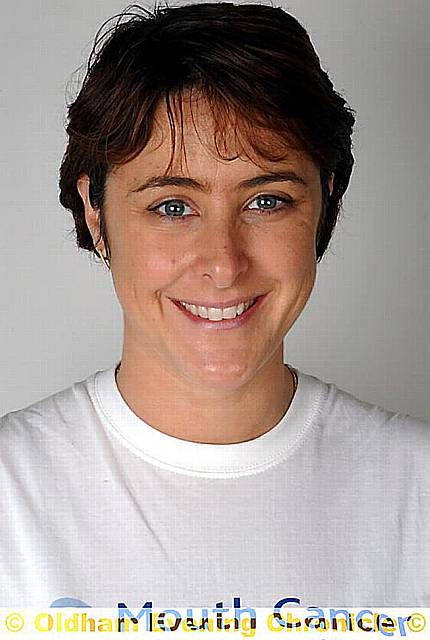Don’t stay silent on mouth cancer
Reporter: Marina Berry
Date published: 28 October 2009

Emma Riley — oral health practitioner
SHOCKING news that one person in the UK dies from mouth cancer every five hours has prompted local health bosses to back a campaign highlighting the warning signs.
Latest figures show a record number of people are being diagnosed with mouth cancer — more than 5,000 a year, with deaths from the disease up by 13 per cent over the last decade to 1,800 a year.
Pennine Acute Trust is supporting the first ever national Mouth Cancer Action Month which advises: “If in doubt, get checked out.”
The tagline urges people to keep an eye out signs of mouth cancer, and to make sure they visit their dentist for routine examinations.
The trust, which runs the Royal Oldham Hospital, and carries out oral maxillofacial surgery and treatment for patients diagnosed with mouth cancer, is running a number of awareness events and drop-in screening clinics as part of the campaign.
The British Dental Health Foundation says there are more deaths from mouth cancer each year than either cervical cancer or testicular cancer.
Yet early detection and diagnosis improve survival chances from just 50 per cent to more than 90 per cent.
Tobacco and alcohol are thought to contribute to three out of four of mouth cancer cases.
Smoking is the number one cause for mouth cancer and people who smoke and drink alcohol to excess are 30 times more likely to develop mouth cancer.
Poor diet is also linked to mouth cancer. Evidence shows an increase in fruit and vegetables lowers the risk, as can fish and eggs.
Mr Bob Woodwards, a consultant and clinical director of oral and maxillofacial surgery at Pennine Acute Trust, said:
“Mouth cancer is a devastating disease, and its effects can be greatly reduced by early detection.
“Anyone experiencing an ulcer or sore area in the mouth or throat that lasts more than three weeks should see their dentist or doctor for professional advice.
Emma Riley, oral health practitioner for the trust believes the campaign can save lives.
She said smoking, drinking and diet were partly to blame for the rise in mouth cancer.
Anyone with mouth cancer symptoms, such as a non-healing ulcer, a lump that is increasing in size, red or white patches, or any concerns about mouth cancer can attend one of the following drop-in clinics:
Monday, November 2, oral surgery department at Rochdale Infirmary, 10am-noon.
Wednesday November 11, oral surgery department at the Royal Oldham Hospital, 2-4pm.
Friday November 20, maxillofacial department at North Manchester General Hospital, 2-4pm
For more information about the drop-in clinics contact Emma on 07973- 700224.




